|
|
|
Sort Order |
|
|
|
Items / Page
|
|
|
|
|
|
|
| Srl | Item |
| 1 |
ID:
139536


|
|
|
|
|
| Summary/Abstract |
In a time of rapid, globalized communication, what are the possibilities for truly meaningful cross-cultural political dialogue? Optimists contend that we may now speak of transnational public spheres—of spaces in which people reach across national boundaries to engage one another on issues of common concern. Skeptics, on the other hand, maintain that political, cultural, and linguistic barriers continue to preclude truly meaningful transnational discourse. And in the wake of 9/11 and the conflicts in Iraq and Afghanistan, many express specific skepticism about the potential for Western and Muslim societies to bridge such divides. Yet little systematic empirical research investigates the realities of cross-national dialogue, particularly between Western and non-Western societies. Using an original dataset produced via content analysis of British and Pakistani newspapers, we examine the discursive links formed during a quintessential transnational media event: the 2005–2006 Danish Muhammad cartoon controversy. Comparing the frames deployed and actors engaged in each of these countries, we find clear evidence of genuine transnational engagement between Muslims and non-Muslims. And though the scope of our data limits our findings, they nonetheless provide a sense of cautious optimism regarding the potential for the formation of transnational public spheres.
|
|
|
|
|
|
|
|
|
|
|
|
|
|
|
|
| 2 |
ID:
139530
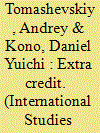

|
|
|
|
|
| Summary/Abstract |
Credit rating agencies such as Moody's and Standard & Poor's have considerable influence in the global economy. Nonetheless, we know little about the factors that affect these ratings, particularly factors under government control. We argue that participation in preferential trade arrangements (PTAs) can significantly improve national credit ratings by “locking in” liberal trade policies at home and abroad. This both ensures a stable stream of export revenues and represents a commitment to market-friendly policies of which the rating agencies approve. We test and find support for this hypothesis with an analysis of intra-PTA trade and credit ratings in 100 countries from 1971 to 2008. As expected, intra-PTA trade consistently improves national credit ratings. However, this effect is only partially mediated by trade volatility and other economic variables, suggesting that the rating agencies' support for PTAs is partly ideological in nature. Interestingly, overall trade openness does not affect credit ratings once we control for participation in PTAs. It is thus the formal commitment to open trade, rather than the volume of trade per se, that improves credit ratings. Our results point to the growing importance of private actors in international governance, as well as to the interrelated nature of trade and financial regimes.
|
|
|
|
|
|
|
|
|
|
|
|
|
|
|
|
| 3 |
ID:
139534


|
|
|
|
|
| Summary/Abstract |
Why do some autocratic governments do better than others in attracting foreign direct investment (FDI)? The received wisdom holds that democracies enjoy advantages over autocracies when it comes to attracting FDI. But there exist autocratic countries that attract substantial amounts of FDI. For example, during the last two decades, about half of the top 20 non-OECD host countries are nondemocratic. Focusing on the role of commitment institutions by which host countries can commit their protection of foreign assets, I argue that autocrats with long time horizons can provide stronger institutions to protect property rights. This allows them to attract more FDI. Using an error correction model (EDM) covering autocratic countries from 1970 to 2008, I find evidence that strongly supports my argument. These findings suggest that what matters to foreign investors is not regime type per se but specific institutional features of the host country. Insofar as host countries provide sound institutions to protect foreign assets, they would be able to attract more foreign investment.
|
|
|
|
|
|
|
|
|
|
|
|
|
|
|
|
| 4 |
ID:
139532
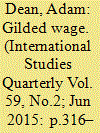

|
|
|
|
|
| Summary/Abstract |
Scholars of international political economy often argue that workers automatically share the same trade policy preferences as their employers. However, this approach assumes that trade policies that increase profits necessarily lead to increases in wages. In contrast, I argue that capital and labor are more likely to share the same trade policy preference when “profit-sharing institutions” permit capital to credibly commit that an increase in profits will lead to an increase in wages. In support of my argument, I present a structured, focused comparison of the American textile and steel workers' unions during the late nineteenth century. Both unions supported the high tariffs that protected their industries when credible profit-sharing institutions were in place, but did not support high tariffs when such institutions were absent.
|
|
|
|
|
|
|
|
|
|
|
|
|
|
|
|
| 5 |
ID:
139524
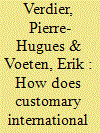

|
|
|
|
|
| Summary/Abstract |
Customary international law (CIL) is a fundamental source of international law. But scholars lack a clear understanding of customary international law, as well as systematic statistical analyses of its workings. Existing theories posit that CIL is a cooperative equilibrium that can be sustained through reciprocity. Yet, CIL lacks institutional features that facilitate reciprocity and is commonly understood to apply universally, even to states that defect or reject a norm. Because the continued existence of CIL depends on state practice, the potential precedential effect of defection encourages cooperation as long as states value the cooperative norm. Consequentially, a state's decision to apply a CIL norm should be a function of the extent to which the norm is practiced in the community of states it interacts with rather than the past behavior of the specific state in an interaction. We test the implications with newly-collected data documenting if and when 121 states switched from absolute to restrictive foreign state immunity. We find no evidence of direct reciprocity. States that most valued absolute immunity and whose defection would most affect others were least likely to defect, but states became more likely to defect as the states whose practice most affected them defected.
|
|
|
|
|
|
|
|
|
|
|
|
|
|
|
|
| 6 |
ID:
139529


|
|
|
|
|
| Summary/Abstract |
This study examines the effect of domestic political change on United Nations General Assembly (UNGA) voting. We argue that foreign policy change is most likely when a new leader—one who relies on different societal groups for support than her predecessor—comes to power. We then examine the extent that domestic institutional context—in particular, democracy—shapes this process. We test our hypotheses using a new measure of UNGA voting patterns and new data on changes in leaders' supporting coalitions. We find that change in the societal support base of leaders leads to change in UN voting, especially in nondemocracies. This study lends credence to the perspective that foreign policy, like domestic policy, can vary with the particular interests that leaders represent; it encourages scholars to focus less on leadership change per se and more on changes in the societal groups to which leaders are most accountable. This study also suggests that democratic institutions inspire policy consistency not only in areas governed by treaties and international law, but also in areas of foreign policy that are easier to alter in the short term.
|
|
|
|
|
|
|
|
|
|
|
|
|
|
|
|
| 7 |
ID:
139526
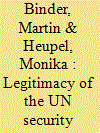

|
|
|
|
|
| Summary/Abstract |
Existing research on the legitimacy of the UN Security Council is conceptual or theoretical, for the most part, as scholars tend to make legitimacy assessments with reference to objective standards. Whether UN member states perceive the Security Council as legitimate or illegitimate has yet to be investigated systematically; nor do we know whether states care primarily about the Council's compliance with its legal mandate, its procedures, or its effectiveness. To address this gap, our article analyzes evaluative statements made by states in UN General Assembly debates on the Security Council, for the period 1991–2009. In making such statements, states confer legitimacy on the Council or withhold legitimacy from it. We conclude the following: First, the Security Council suffers from a legitimacy deficit because negative evaluations of the Council by UN member states far outweigh positive ones. Nevertheless, the Council does not find itself in an intractable legitimacy crisis because it still enjoys a rudimentary degree of legitimacy. Second, the Council's legitimacy deficit results primarily from states' concerns regarding the body's procedural shortcomings. Misgivings as regards shortcomings in performance rank second. Whether or not the Council complies with its legal mandate has failed to attract much attention at all.
|
|
|
|
|
|
|
|
|
|
|
|
|
|
|
|
| 8 |
ID:
139533


|
|
|
|
|
| Summary/Abstract |
Does language choice attract foreign direct investment (FDI), and if so, how? We argue that language—a dynamic instrument for reducing transaction costs—can influence investors' decision to allocate capital. Potential host countries attract investments by coordinating their domestic language policies—especially those in education—to match the language of the potential FDI investor. We subject our argument to three different tests: (i) a cross-sectional sample of all global Organization for Economic Co-operation and Development investments that employs a newly constructed language-in-education measurement; (ii) a newly assembled time-series cross-sectional data set of all Chinese FDI abroad; and (iii) a detailed case study that uses process tracing to explain Chinese FDI in Indonesia. The results from these tests demonstrate a significant and robust relationship between language and FDI.
|
|
|
|
|
|
|
|
|
|
|
|
|
|
|
|
| 9 |
ID:
139531


|
|
|
|
|
| Summary/Abstract |
In this paper, we provide one of the first systematic analyses of gender's effect on trade attitudes. We draw on a unique representative national survey of American workers that allows us to evaluate a variety of potential explanations for gender differences in attitudes toward free trade and open markets more generally. We find that existing explanations for the gender gap, most notably differences between men and women in economic knowledge and differing material self-interests, do not explain the gap. Rather, the gender difference in trade preferences and attitudes about open markets is due to less favorable attitudes toward competition among women, less willingness to relocate for jobs among women, and more isolationist non-economic foreign policy attitudes among women.
|
|
|
|
|
|
|
|
|
|
|
|
|
|
|
|
| 10 |
ID:
139525
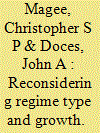

|
|
|
|
|
| Summary/Abstract |
Some recent papers have concluded that authoritarian regimes have faster economic growth than democracies. These supposed growth benefits of autocracies are estimated using data sets in which growth rates rely heavily on data reported by each government. Governments have incentives to exaggerate their economic growth figures, however, and authoritarian regimes may have fewer limitations than democracies on their ability to do so. This paper argues that growth data submitted to international agencies are overstated by authoritarian regimes compared to democracies. If true, it calls into question the estimated relationship between government type and economic growth found in the literature. To measure the degree to which each government's official growth statistics are overstated, the economic growth rates reported in the World Bank's World Development Indicators are compared to a new measure of economic growth based on satellite imaging of nighttime lights. This comparison reveals whether or not dictators exaggerate their true growth rates and by how much. Annual GDP growth rates are estimated to be overstated by 0.5–1.5 percentage points in the statistics that dictatorships report to the World Bank.
|
|
|
|
|
|
|
|
|
|
|
|
|
|
|
|
| 11 |
ID:
139537


|
|
|
|
|
| Summary/Abstract |
Research on interest representation in multijurisdictional polities teaches us much about the activities of a variety of groups that mobilize beyond the state. Scholars, however, largely overlook one type of group: regional authorities. Using data from a telephone survey of senior regional officials in 60 regions and five countries, I investigate the determinants of regional influence in the world's most advanced multijurisdictional polity, the European Union (EU). I find limited regional influence in the EU. Such influence, however, increases with a region's size and with the supranational embeddedness of its top officials. Surprisingly, levels of decentralization play only an indirect role. Hence, two logics appear to drive regional success: (i) a representational logic—as the more populous wield more influence—and (ii) a cumulative advantage logic (the “Matthew effect”). While the representation of the many over the few is in line with democratic principles, the cumulative advantage logic contradicts the EU's stated objective of an ever-closer union.
|
|
|
|
|
|
|
|
|
|
|
|
|
|
|
|
| 12 |
ID:
139523


|
|
|
|
|
| Summary/Abstract |
Among the explanations for state ratification of human rights treaties, few are more common and widely accepted than the conjecture that states are rewarded for ratification by other states. These rewards are expected to come in the form of tangible benefits—foreign aid, trade, and investment—and intangible benefits such as praise, acceptance, and legitimacy. Surprisingly, these explanations for ratification have never been tested empirically. We summarize and clarify the theoretical underpinnings of “reward-for-ratification” theories and test these propositions empirically by looking for increased international aid, economic agreements, and public praise and recognition following ratification of four prominent human rights treaties. We find almost no evidence that states can expect increased tangible or intangible rewards after ratification. Given the lack of empirical support, alternative explanations seem more appealing for understanding human rights treaty ratification.
|
|
|
|
|
|
|
|
|
|
|
|
|
|
|
|
| 13 |
ID:
139527


|
|
|
|
|
| Summary/Abstract |
Do intergovernmental organizations (IGOs) screen out conflict-prone states? We argue that IGOs have incentives to guard against admitting new members that pose significant security risks. Using a data set based on state–IGO pairings, we find clear evidence of screening: As security risk increases, the probability of IGO membership declines. Our findings underscore the importance of accounting for possible selection bias when studying the effects of IGO membership on conflict. Indeed, the types of IGOs sometimes found to be most effective at promoting peace—namely highly institutionalized organizations and those with a security mandate—also prove particularly selective and sensitive to risk.
|
|
|
|
|
|
|
|
|
|
|
|
|
|
|
|
| 14 |
ID:
139535


|
|
|
|
|
| Summary/Abstract |
The rapid global spread of quotas for women constitutes one of the most significant political developments of the last thirty years. It transformed the composition of legislatures worldwide. Yet we lack a solid understanding of the forces driving quota diffusion. In this article, we consider how global pressure from the international women's movement affects national gender quota adoption. In the first quantitative analysis of this question on a global scale, we use event history techniques to examine global, transnational, and national influences on quota adoption in 149 countries between 1989 and 2008. Contributing to work on international norm diffusion, we find a crucial role for women's activism, but uncover a negative interaction between increased global pressures and domestic ties to women's transnational organizing. We suggest global pressure to adopt quotas may be weakened by the diverse agendas of women's activist organizations, by perceived threats to male elites posed by women's agitation, or both.
|
|
|
|
|
|
|
|
|
|
|
|
|
|
|
|
| 15 |
ID:
139528
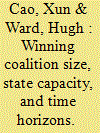

|
|
|
|
|
| Summary/Abstract |
Selectorate theory proposes that authoritarian regimes supply fewer public goods than democracies. Smaller winning coalitions make it less costly for autocracies to maintain support among critical groups by providing private goods. Democracies, with large winning coalitions, find it cheaper to provide public goods. In contrast, we argue for a conditional effect of winning coalition size on public good provisions: Many public goods require considerable state capacity to plan, legislate, and implement. Moreover, leaders with short-term horizons are unlikely to invest in public goods that take considerable time to provide. Therefore, our modified selectorate theory suggests that governments will provide public goods if the size of the winning coalition is large enough, state capacity is great enough, and a priori regime durability is long enough. We test our theory on air pollution. While selectorate theory receives little empirical support, our findings cohere with modified selectorate theory. In particular, core democracies—defined as those with large winning coalitions, considerable state capacity, and high regime stability—perform better than autocracies in controlling air pollution.
|
|
|
|
|
|
|
|
|
|
|
|
|
|
|
|
|
|
|
|
|